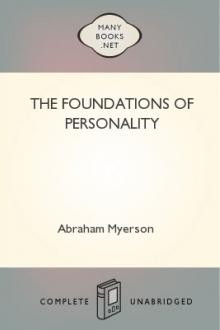The Foundations of Personality - Abraham Myerson (best large ereader .txt) 📗

- Author: Abraham Myerson
- Performer: 1596050667
Book online «The Foundations of Personality - Abraham Myerson (best large ereader .txt) 📗». Author Abraham Myerson
almost obsessed by the belief that he knew but little compared to
others.
One day there walked into my office a lady, head of a large
enterprise, who had been pointed out to me some time previously
as the very personification of self-assurance and superiority. A
dignified woman of middle age, whose reserve and correct manners
impressed one at once; she bore out in career and casual
conversation this impression of one whose confidence and belief
in herself were not misplaced, in other words, a harmoniously
developed egotist. What she came to consult me about, was—her
feeling of inferiority!
All of her life, said she, she had been overawed by others. As a
girl her mother ruled her, and her younger sister, more charming
and more vivacious, was the pet of the family. Brought up in a
strict church, she developed a firmness of speech and conduct
that inhibited the frankness and friendliness of her social
contacts. Because of this, and her overserious attitudes
generally, girls of her own age rather avoided her, and she
became painfully self-conscious in their company as well as in
the company of men. She wanted to “let go” but could not, and in
time felt that there was something lacking in her, that people
laughed at her behind her back and that no one really liked her.
Her reaction to this was to determine that she would not show her
real feelings, that she would deal with the world on a basis of
“business only” and cut out friendship from her life. Her
intelligence and her devotion to her work brought her success,
and she would have gone her way without regard for her
“inferiority complex” had not chance thrown in her way a young
woman colleague who saw through her elder’s pose and became her
friend. My patient drank in this friendship with an avidity the
greater for her long loneliness, and she was very happy until the
younger woman fell in love with a man and began to neglect her
colleague.
This broke Miss B.‘s spirit. “Had I not known friendship I might
have gone on, but now I feel that every one must see what a fool
I am and what a fool I have been. I am more shy than ever, I feel
as if every one were really stronger than I am, and that some day
everybody will see through my pose,—and then where will I be?”
Hide-and-go-seek is one of the great games of adults as well as
of children. We hide our own defects and seek the defects of
others in order to avoid inferiority and to feel competitive
superiority. But there is a deep contradiction in our natures: we
seek to display ourselves as we are to those who we feel love us,
and we hide our real self from the enemy or the stranger. The
protective marking of birds and insects “amateurish compared to
the protective marking we apply to ourselves.
I forbear from depicting further character types. People are not
as easily classified as automobiles, and the combinations
possible exceed computation. Character growth, in each individual
human being, is a growth in likeness to others and a growth in
unlikeness, as well. As we move from childhood to youth, and
thence to middle and old age, qualities appear and recede, and
the personality passes along to unity and harmony or else there
is disintegration. He who believes as I do that the Grecian sage
was immortally right when he enjoined man to know himself will
agree that though understanding character is a difficult
discipline it is the principal science of life. We are only
starting such a science; we need to approach our subject with
candor and without prejudice. Though our subject brings us in
direct contact with the deepest of problems, the meaning of life,
the nature of the Ego and the source of consciousness, these we
must ignore as out of our knowledge. Limiting ourselves to a
humble effort to know our fellow men and our own selves, we shall
find that our efforts not only add to our knowledge but add
unmeasurably to our sympathy with and our love for our fellows.
End of The Project Gutenberg Etext of The Foundations of Personality





Comments (0)